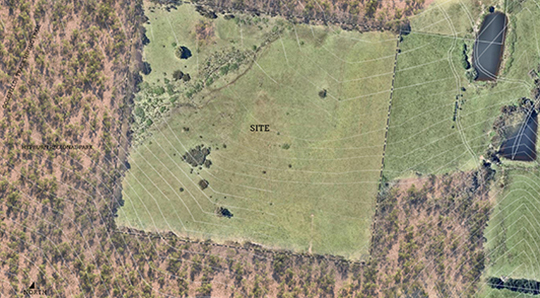Studio 40
The Field: Caretakers of Country
A/Prof Rochus Urban Hinkel

This studio is available to students enrolled in ABPL90143 Studio D and ABPL90115 Studio E only.
Studio Description
In Studio 40 we engage with questions of Country, Indigenous knowledge systems, histories of places, and current and past cultural production. Our site is former farmland, close to Daylesford and next to a hiking trail – located on Dja Dja Wurrung Country. We will study Indigenous seasons, management of Country, representation of Indigenous culture, and develop proposals for places of gathering, caretaking and seasonal housing. We develop architectural projects that re-think and re-develop the site, respond to its cultural roles and develop sustainable architectural proposals, in exchange and in response to Dja Dja Wurrungs’ needs and ideas.
Studio 40 engages with larger cultural and environmental questions but develops local responses. Students develop their own environmental, socio-political, and architectural framework that they see fit in response to these challenges. Project proposals can range from radical and utopian to very detailed and realistic architectural proposals.
Studio Outcomes
We will study relevant literature and undertake a two-day site visit to develop a deeper understanding of the historical and cultural as well as the environmental and political context. We develop design and consultation workshops, framed through talks, tours and lectures.
In Studio 40 we use Augmented Reality to develop, represent and discuss architectural proposals. A physical site model (1:200) and a digital landscape model (Rhino) are available to be used. Results from Sem 2, 2020 have been exhibited at the Melbourne Design Week in 2021. Knowledge of Rhino 3D modelling software is expected and necessary.
Studio Leader
Rochus Urban Hinkel Rochus has taught architecture at RMIT University and the Art Academy in Stuttgart, further former positions include Professor of Artistic Design, OTH Regensburg, Germany, and Professor of Interior Design and Furniture Design at Konstfack University of Arts, Craft and Design, Stockholm.
Current research includes a traditional owner-led project with the Olkola Aboriginal Corporation at Cape York together with Dr. Hannah Robertson (MSD). His VR project 'Voices of Country', developed with the NExT Lab (MSD), Prof Hélène Frichot and Büro Achter April, has been presented at the media arts festival Ars Electronica in 2020.
Readings & References
- Cahir, F., Clark, I. D., & Clarke, P. A. (2018). Aboriginal Biocultural Knowledge in South-eastern Australia. Melbourne: CSIRO Publishing.
- Frichot, H., & Hinkel, R. (2020). Voices of Country. Ars Electronica. Retrieved from https://ars.electronica.art/keplersgardens/files/2020/08/Utopia-Voices_of_Country-Essay.pdf
- Gammage, B. (2012), The Biggest Estate on Earth. Crows Nest, NSW: Allen & Unwin.
- Memmott, P. (2007). Gunya, Guoondie + Wurley. St Lucia, Queensland: University of Queensland Press.
- Memmot, P. (1997). Aboriginal Signs and Architectural Meanings. Part 2. ATR (Architectural Theory Review), 38-64.
- Memmott, P. (1996). Aboriginal Signs and Architectural Meanings. Part 1. ATR (Architectural Theory Review), 79-100.
- Pascoe, B. (2014). Dark Emu. Broome: Magabala Books Aboriginal Corporation.
- Sutton, P., & Walshe, K. (2021) Farmers or hunter-gatherers? : the Dark Emu debate. Carlton, VIC: Melbourne University Press, 2021.
Schedule Mondays and Thursdays 15:15-18:15